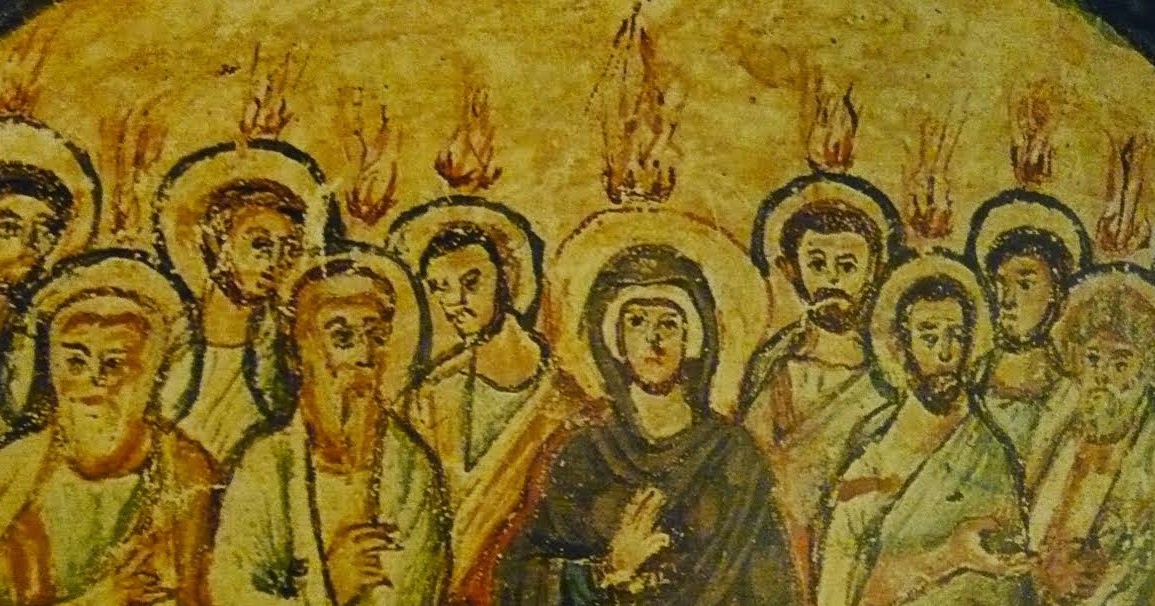
Stephen
Terry, Director

Pentecost
Commentary
for the July 14, 2018 Sabbath School Lesson
 “When
the day of Pentecost came, they were all together in one place. Suddenly a
sound like the blowing of a violent wind came from heaven and filled the whole
house where they were sitting. They saw what seemed to be tongues of fire that
separated and came to rest on each of them. All of them were filled with the
Holy Spirit and began to speak in other tongues as the Spirit enabled them.” Acts
2:1-4, NIV
“When
the day of Pentecost came, they were all together in one place. Suddenly a
sound like the blowing of a violent wind came from heaven and filled the whole
house where they were sitting. They saw what seemed to be tongues of fire that
separated and came to rest on each of them. All of them were filled with the
Holy Spirit and began to speak in other tongues as the Spirit enabled them.” Acts
2:1-4, NIV
The King James Version of the Bible states that they
were “all with one accord.” Apart from the old saw about Hondas being mentioned
in this verse, it is striking that the unity portrayed by the writer here
should be associated with an event that is a cause of division between modern
church denominations, between those who are considered “charismatic” and those
who are not. The idea of Christians speaking gibberish is where the heart of
the contention lies. For Seventh-day Adventists, the rise of the charismatic
movement created a certain amount of alarm. Roland R. Hegstad, Editor of
Liberty Magazine, saw the movement as barbarians[i] “Rattling the Gates” of
Adventism, and published a book about it with that title in 1974. Often said to
be connected with the New Age movement which conservative churches saw as
anything but Christian, the egalitarian nature of a charismatic calling as
opposed to one handed down by human administrators could indeed threaten to
rattle the gates of authority and power within the denomination. It is not
simply coincidental that the same passage in Joel that Peter referred to in
explaining the sudden out pouring of the Spirit at Pentecost is also used by
those advancing women’s ordination, a prospect perhaps terrifying to the men
who have entrenched themselves in power over the denomination.
The circumstances are not much different now than they
were then. A solidly entrenched patriarchal priesthood exercised total control
over the temple and what was acceptable for worship in its precincts. Jesus
repeatedly ran afoul of these authorities when he healed at the temple and
elsewhere on Sabbath, challenged the buying, selling and money exchanging going
on at the temple, and acted as though he had some kind of authority over these
things, even though no one in the priesthood had granted him such. That priesthood
had amassed a vast body of rules for behavior based on generations of priests
before them who had interpreted in great detail how to apply the commandments
written in the Pentateuch. They claimed God-given authority to do this, but
refused to acknowledge that God might grant that authority to whom he will. The
early Christian believers came face-to-face with this when confronted with the
calling of Paul outside of Damascus. They had already begun to establish their
own hierarchal power structure based on those who had been with Jesus from the
beginning, whom they felt should naturally be the arbiters of what is and is
not God’s will for his followers. This is what brought Matthias to the fore.
But then God called Paul. They questioned, “Who is this?” It may have seemed as
if Judas were claiming authority. After all, Paul was a rabid persecutor of
those who preached in the name of Jesus. Sometimes, I wonder if our human
tendency to bind up everything within an intricate system of ordinances and
creeds doesn’t actually force God to work outside of such a system. As I have
mentioned, and the gospels have revealed repeatedly, such power structures
appear to have worked in opposition to Jesus’ ministry on several occasions. If
he is the representation of the Father, then it stands to follow that God the
Father may be just as challenged as Jesus was by our rule making.
Like those Jewish priests did two thousand years ago, we
tend to get our backs up when the basis of our authority is challenged,
especially if it is done on a charismatic basis. As our lesson quarterly points
out, and accurately so, the “gift of tongues” as portrayed in the Pentecost
event is the ability to speak various languages, enabling those who have
traveled to Jerusalem from foreign lands to hear the gospel message and carry
it back to their home countries. There is no indication that it was senseless
babble of a kind often practiced by modern Pentecostals. It facilitated the
proclamation of the gospel rather than obscuring it behind a charismatic veneer
that could only be interpreted by insiders. That latter is more akin to
Gnosticism than to early Christianity, which also had to contend with gnostic influences
that threatened to divert from the proclamation of the simple gospel of Christ.
All that being said, we may be too
limited in our view if we claim that the gift of tongues is always the ability
to speak a foreign language intelligible to other human beings.
Paul mentions elsewhere “tongues of angels.”[ii] This implies that the
gift of tongues is not limited only to the family of human languages. It also
implies a gift not specifically meant to bring salvation to the lost. What
would be the use of unintelligible angelic language for doing that?
Nonetheless, Paul does seek to put constraints on such practices, stating that
all things must be done decently and in order, including refraining from speaking
in unintelligible languages without interpretation.[iii]
Perhaps more troubling than the promotion of unintelligible
babble as a genuine gift of the Spirit is the teaching by some that one must “pray
though to receive the Spirit.” This is often coupled with evidence of the
answer to that prayer only being acceptable in the form of such babble. I
cannot speak to whether Pentecostals still follow this practice but back at the
time that Hegstad wrote his book, I attended, with invitation, some Pentecostal
worship services where this was exactly what I was told. The pressure placed
upon me to join with the general chaos referred to as “praying in the Spirit”
was immense. It was so much so that it felt oppressive rather than liberating.
I have felt similar pressure from vacuum sales persons trying to close a sale.
It speaks more of manipulation than invitation. Jesus promises us if we come to
him, we will have rest from the trials of life.[iv] He does not severely
pressure us until we succumb. That would not be free will. God is love and his
kingdom is one of love, love cannot exist where it is forced. It follows then
that a gift of the Spirit that is forced may be of another spirit entirely. Perhaps
this is why we are told to “test the spirits.”[v]
But there needs to be balance in our approach to the
charismatic aspects of faith. Paul, in spite of the constraints he sought to
enhance order during worship, also wrote that we not quench the Spirit.[vi] Too much regulation tends
to do just that, placing human order and authority over the movement of the
Spirit. It seems to be the logical thing to do to prevent heretical expressions
of faith. But this also can invite the multiplication of rules to provide the
basis for the exercise of such authority. Those rules tend to be founded upon
our human perspective which is woefully inadequate when it comes to things of
the Spirit. As Jesus shared with Nicodemus, the Spirit is ephemeral.[vii] We may as well try to
draw a picture of the wind. Medieval artists attempted to do so with pictures
of faces blowing puffs of air. Even today we struggle, every attempt to do so tends
to devolve into a picture of the wind’s effects, not of the wind itself.
Perhaps then, our attempts to stifle the Spirit by controlling it are doomed to
failure for similar reasons. The temple that the Jewish priests sought to
protect with their power and authority ceased to exist soon after Jesus’ death
and resurrection. All of our attempts to tightly control faith and its
expression may be headed in the same direction. For many, it is difficult to
see loving expressions of faith beyond the more obvious expressions of authoritarianism,
and for too many, this can result in the established authorities and structures
of such institutions fading into irrelevance. This does not mean that faith is
dead. It only begs the question, “Why should I take on the oppressive yoke of
the church, when Jesus offers a much lighter one?”[viii]
This may well be a message for our charismatic friends
as well. Attempts to “bottle up” the Spirit as a bit of spiritual merchandise
to be hawked by those in the know, according to certain rituals and processes may
cause others to see such shenanigans as the “snake oil” they truly are. It is
possible for even charismatics to quench the Spirit through their attempts at
excessive ownership and control of that charisma. Whether we claim to be
liturgical, denominational or even non-denominational, we may find it
profitable to stop using old wineskins to bottle up the Spirit and allow the
Spirit to flow where it will, enabling the free expression of its power rather
than our own.
